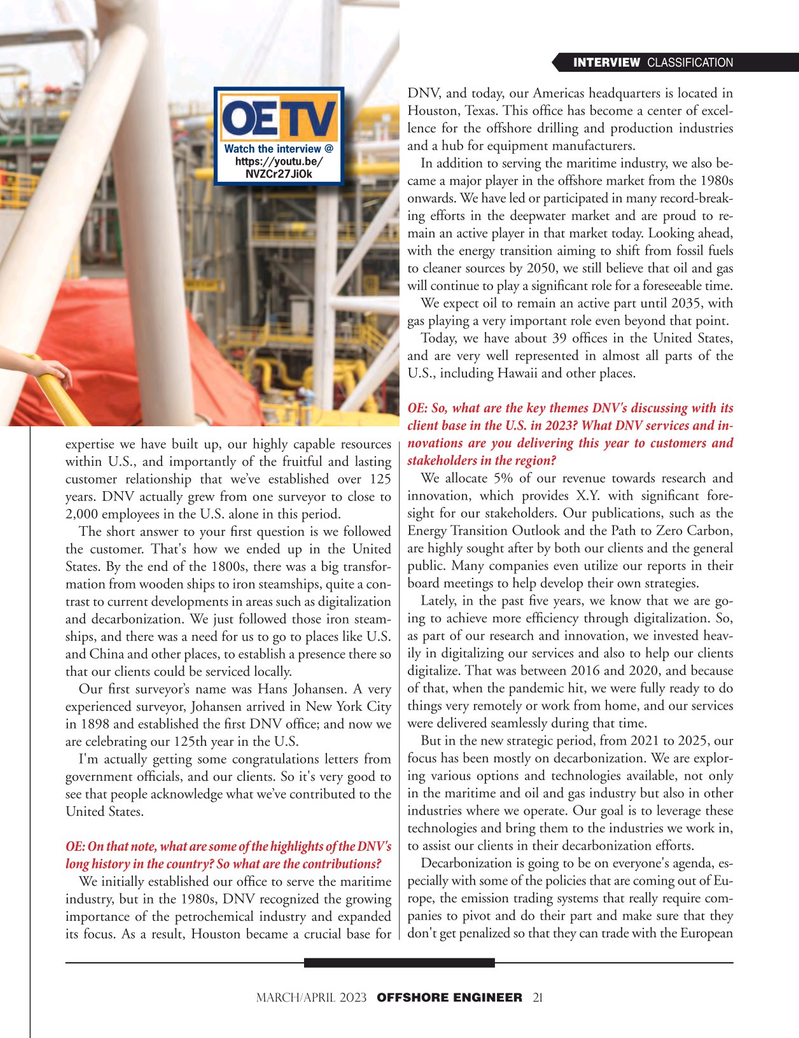
Page 21: of Offshore Engineer Magazine (Mar/Apr 2023)
Read this page in Pdf, Flash or Html5 edition of Mar/Apr 2023 Offshore Engineer Magazine
INTERVIEW CLASSIFICATION
DNV, and today, our Americas headquarters is located in
Houston, Texas. This offce has become a center of excel- lence for the offshore drilling and production industries and a hub for equipment manufacturers.
Watch the interview @ https://youtu.be/
In addition to serving the maritime industry, we also be-
NVZCr27JiOk came a major player in the offshore market from the 1980s onwards. We have led or participated in many record-break- ing efforts in the deepwater market and are proud to re- main an active player in that market today. Looking ahead, with the energy transition aiming to shift from fossil fuels to cleaner sources by 2050, we still believe that oil and gas will continue to play a signifcant role for a foreseeable time.
We expect oil to remain an active part until 2035, with gas playing a very important role even beyond that point.
Today, we have about 39 offces in the United States, and are very well represented in almost all parts of the
U.S., including Hawaii and other places.
OE: So, what are the key themes DNV's discussing with its client base in the U.S. in 2023? What DNV services and in- expertise we have built up, our highly capable resources novations are you delivering this year to customers and within U.S., and importantly of the fruitful and lasting stakeholders in the region?
customer relationship that we’ve established over 125 We allocate 5% of our revenue towards research and years. DNV actually grew from one surveyor to close to innovation, which provides X.Y. with signifcant fore- 2,000 employees in the U.S. alone in this period. sight for our stakeholders. Our publications, such as the
The short answer to your frst question is we followed Energy Transition Outlook and the Path to Zero Carbon, the customer. That's how we ended up in the United are highly sought after by both our clients and the general
States. By the end of the 1800s, there was a big transfor- public. Many companies even utilize our reports in their mation from wooden ships to iron steamships, quite a con- board meetings to help develop their own strategies.
trast to current developments in areas such as digitalization Lately, in the past fve years, we know that we are go- and decarbonization. We just followed those iron steam- ing to achieve more effciency through digitalization. So, ships, and there was a need for us to go to places like U.S. as part of our research and innovation, we invested heav- and China and other places, to establish a presence there so ily in digitalizing our services and also to help our clients that our clients could be serviced locally. digitalize. That was between 2016 and 2020, and because
Our frst surveyor’s name was Hans Johansen. A very of that, when the pandemic hit, we were fully ready to do experienced surveyor, Johansen arrived in New York City things very remotely or work from home, and our services in 1898 and established the frst DNV offce; and now we were delivered seamlessly during that time.
are celebrating our 125th year in the U.S. But in the new strategic period, from 2021 to 2025, our
I'm actually getting some congratulations letters from focus has been mostly on decarbonization. We are explor- government offcials, and our clients. So it's very good to ing various options and technologies available, not only see that people acknowledge what we’ve contributed to the in the maritime and oil and gas industry but also in other
United States. industries where we operate. Our goal is to leverage these technologies and bring them to the industries we work in,
OE: On that note, what are some of the highlights of the DNV's to assist our clients in their decarbonization efforts. long history in the country? So what are the contributions? Decarbonization is going to be on everyone's agenda, es-
We initially established our offce to serve the maritime pecially with some of the policies that are coming out of Eu- industry, but in the 1980s, DNV recognized the growing rope, the emission trading systems that really require com- importance of the petrochemical industry and expanded panies to pivot and do their part and make sure that they its focus. As a result, Houston became a crucial base for don't get penalized so that they can trade with the European
MARCH/APRIL 2023 OFFSHORE ENGINEER 21

 20
20

 22
22